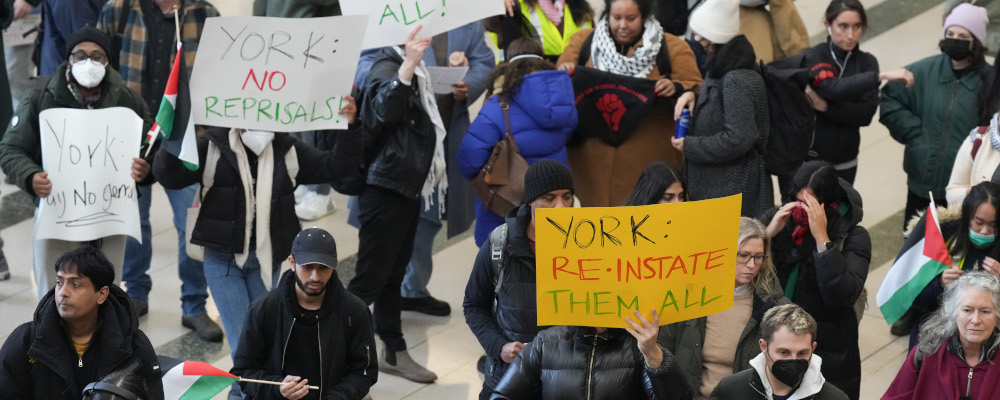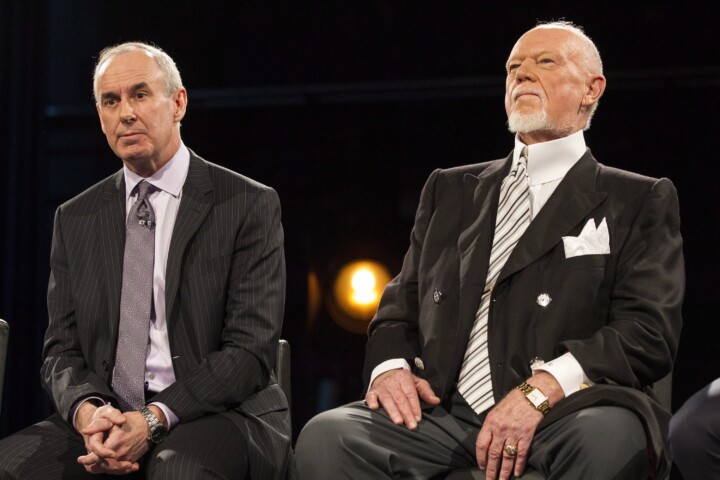Hamas’s brutal terrorist attack of October 7 and Israel’s military response in northern Gaza have shocked and saddened all thoughtful observers. Beyond its human cost, the conflict has unleashed a bitter debate regarding the geopolitics of the Middle East, with implications for many Canadians’ ethnic and religious identities. Unsurprisingly, Canadian universities have become battlegrounds for this debate, with both faculty and students engaging in provocative—and at times, offensive—political expression in support of Palestine.
Regrettably, this expression has been met with official censure and condemnation, including the political targeting of students and faculty. In a speech to the Ontario Legislative Assembly, Jill Dunlop, the Ontario Minister of Colleges and Universities, took the extraordinary step of singling out faculty, student organizations, and even individual students for allegedly glorifying terrorism. Listing faculty and students by name, Ms. Dunlop recommended their investigation and potential discipline, warning that they would be “held to account.”
Canadian universities have also censured academic expression themselves. In response to student organization statements that seemed to celebrate Hamas’ attack, McMaster University, York University, and Toronto Metropolitan University’s school of law issued formal statements denouncing their own students’ political views. TMU has gone even further, appointing a prominent retired judge to conduct an external review of recent student expression. In the context of a broader climate of targeting, identifying, and “cancelling” pro-Palestine activists, these measures have cast a chill over academic expression, with many scholars reluctant to engage with the Israel-Palestine conflict at all.
I hold no strong views on the moral responsibility for the cycle of violence in the Middle East, a tragic and complex subject that lies far outside my academic expertise. However, as a teacher and researcher deeply committed to academic freedom, I have viewed the policing of pro-Palestine expression with concern. Universities are a unique environment for the unfettered search for truth, a pursuit that demands the free expression of controversial ideas. Throughout history, social and technological progress has been driven by unconventional thinking, and universities have traditionally been sites for the exchange (and critique) of unconventional views. To regulate expression on sensitive or controversial subjects is to undermine the purpose of the university itself.
Unfortunately, universities appear to be straying from this core mission. The Israel-Palestine debate is just one of many examples of identitarian political sensitivities trumping the free expression of ideas. Many universities seem more concerned with the psychological comfort of students and faculty than with the open discussion of important issues. In this sense, Israel-Palestine is of a piece with debates over racial justice, transgenderism, and the history of Canadian residential schools, in which dissenting views have been strongly discouraged if not explicitly condemned by Canadian universities. Indeed, many pro-Palestine scholars are learning first-hand what academics on the Right have known for years: that their political views are unwelcome and expressed at their own professional risk.
These developments represent an alarming trend, but all is not lost. Canadian universities—among the best in the world—remain strongly protective of academic freedom in most circumstances. There is still time to counter threats to open academic discourse. To do so, Canadian universities should affirm the following three principles.
Universities should resist pressures to censure academic expression.
The first principle is that, at a bare minimum, universities should not interfere with the academic expression of their members. When faced with external pressure from activists, donors, or public officials, universities should publicly respond—if at all—only by affirming their commitment to academic freedom. In times of intense external criticism, universities should support targeted faculty members and assure them that they are protected. This assurance is especially important for untenured and sessional faculty members, who lack the employment security of their more senior colleagues. Under no circumstances should universities investigate or discipline individual faculty members for engaging in constitutionally protected expression.
Universities should also refrain from publicly criticizing academic speech, including that of students. What universities should not do is precisely what McMaster, York, and TMU have done—publicly denounce expression by university members. The recent statements by these and other universities are not only inappropriate but have also been selectively applied to certain perspectives and not others.
York’s statement of October 13, issued in response to a provocative student union statement, is a prime example. York publicly condemned the student statement, demanding that its signatories “immediately clarify” that they reject violence, on pain of formal disciplinary action. According to the university, freedom of expression “has limits” and “must never reach into promoting or justifying violence against unarmed civilians.” Read literally, this claim is absurd on its face, as violence against unarmed civilians has been explicitly justified across a range of conflicts, including Israel-Palestine itself. As of this writing, certain scholars continue to justify Israel’s military campaign in northern Gaza, which has inevitably and predictably killed thousands of unarmed civilians. Whether these justifications are persuasive is a matter of contention, but no one would claim that they are outside the bounds of legitimate academic expression. Without open discussion of the underlying issues, it is unclear why killing civilians is justifiable in certain contexts but not others.
In fact, despite York’s statement, the morality of violence as a means of achieving political ends is a crucially important subject that demands a robust exchange of ideas. As the days and weeks following Hamas’s attack made clear, there are many different perspectives on the nature of the Israel-Palestine conflict, and many different understandings of the causes and solutions to the ongoing violence. Universities are precisely the place for these perspectives to be expressed, challenged, criticized, and revised in a context of open communication and debate. Silencing disagreement through threat of institutional sanction is antithetical to the very meaning of the university.
Universities should avoid taking political stances.
The second principle is that universities should avoid taking political stances, particularly on issues of public controversy. This includes not only denouncements of student expression but also affirmative statements of support for social or political causes. These statements of support—often accompanied by formal action plans—have proliferated in recent years, with dozens of statements by universities and academic departments in support of Truth and Reconciliation, anti-racism, combatting climate change, and other progressive causes. Given the frequency of these overtly political statements, it is hardly surprising that both pro-Palestine and pro-Israel factions of the academic community have been angered and disappointed by neutral expressions of concern. Indeed, many of the student statements recently condemned by university authorities were themselves responses to universities refraining from criticizing Israel. Had universities not created an expectation of political messaging, there would be less controversy when they choose to remain neutral.
Beyond this practical consideration, there is a deeper and more fundamental reason for universities to avoid political statements. When a university takes a formal position on any contested political issue, it is speaking on behalf of all members of the university community. Any faculty or students dissenting from the university’s official position are effectively silenced. Not only have they been spoken for collectively, they are implicitly discouraged from voicing disagreement. Individual faculty should be free to espouse whatever causes they choose, but advocacy should be avoided at the institutional level.

Universities should treat all academic expression equally.
In what should hopefully be an obvious point, universities should not discriminate among favoured and disfavoured viewpoints. Just as universities should protect pro-Palestine expression, they should also protect other categories of potentially offensive ideas. Universities must strongly resist calls to suppress or punish expression simply because it offends certain members of the university community. With the rise of “diversity, equity, and inclusion” as a guiding principle in higher education, universities have become increasingly concerned with sheltering their students from uncomfortable ideas.
Across Canada, faculty and student organizations have been formally and informally sanctioned for, among other things, questioning transgender identity, displaying images of the Prophet Mohammed, and using racial epithets (in a pedagogical context). Although these forms of expression may be shocking and offensive to some, subjective offense is not the measure of acceptable academic expression. This is especially true given how easily offense or discomfort can be recharacterized as threats to “well-being,” “safety,” or even one’s personal existence. These hyperbolic conceptions of negative emotions as existential threats pose a growing danger to the free exchange of ideas. Allegations of racism, transphobia, antisemitism, and a host of other forbidden viewpoints are increasingly weaponized to silence unwelcome expression.
In recent years, attacks on academic freedom have often come from the political Left, which has long dominated academic politics. These attacks have significantly affected the intellectual climate, with many conservative and even centrist academics afraid to voice their political views. According to a study published by the Macdonald-Laurier Institute, fear of negative consequences has led to self-censorship by 57 percent of Right-leaning university professors. The fact that the pro-Palestine movement, typically associated with the Left, is now being subject to similar pressures should be a wake up call to all academics. Allowing politics to dictate the scope of acceptable expression is a recipe for a devitalized intellectual environment.
To be clear, academic freedom should not encompass hate speech, targeted harassment, or the incitement of violence. Universities have a responsibility to ensure the physical security of their community members, and students have a right to be free from genuinely hateful expression. In enforcing these standards, however, universities should set a high threshold, consistent with Canadian law. Vitriolic criticism of Israel or even abstract support for terrorism is simply not enough unless it is accompanied by the direct threat of violence.
Speaking for myself, I find the rhetoric of pro-Palestine activism simplistic and tendentious, and I have found the equivocations regarding terrorism among certain elements of the pro-Palestine Left to be morally repugnant. The discomfort of being confronted with perspectives much different from one’s own is the price of intellectual freedom, however. My responsibility as a scholar is to challenge ideas I disagree with, not attempt to silence or punish them as inherently illegitimate. To be sure, debate and disagreement can be difficult, uncomfortable work, and scholars who advance polemical arguments—regarding Palestine or any other subject—should be willing to face harsh criticism. But preserving academic freedom, and its commitment to the search for truth requires that we accept this challenge.
Recommended for You

Falice Chin: A tale of two (Poilievre) ridings

Evan Menzies: Calgary at 150: Why is it so hard to celebrate our history?

‘We’re winning the battle of ideas’: Conservative MP Aaron Gunn on young men moving right, the fall of ‘wokeness,’ and the unraveling of Canadian identity

Laura David: Red pill, blue pill: Google has made its opening salvo in the AI-news war. What’s Canadian media’s next move?



